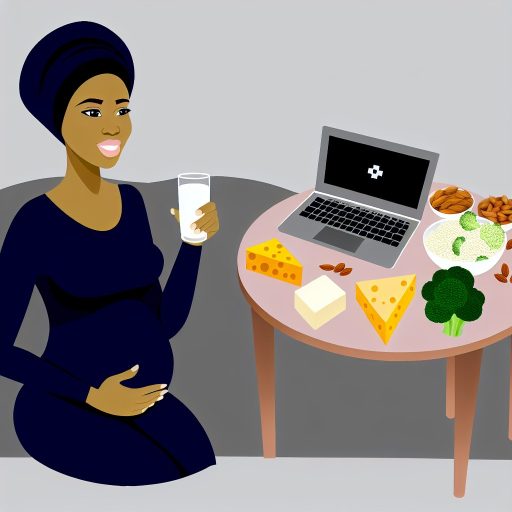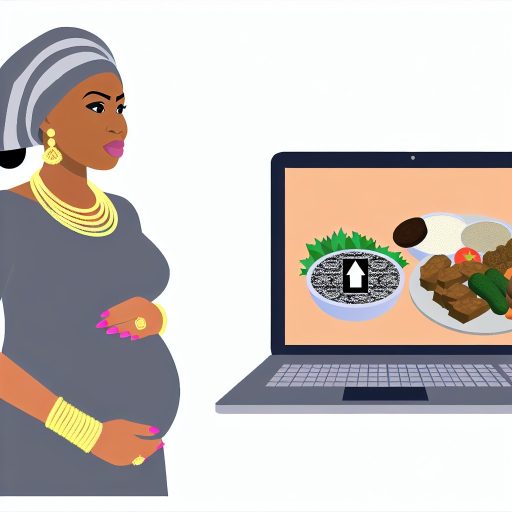Introduction
Adequate intake of vitamins and minerals is crucial during pregnancy.
Proper nutrition supports the health of both the mother and the developing baby.
This blog post focuses on the unique nutritional needs of Nigerian pregnancies.
Essential Vitamins for Nigerian Pregnancies
- Folic acid is crucial in preventing birth defects.
- Vitamin D is important for the bone health of both mother and baby.
Benefits of Folic Acid
Folic acid is also known as folate.
It is a B vitamin that is crucial for pregnant women.
Folic acid plays a vital role in the development of the baby’s neural tube.
The neural tube eventually becomes the baby’s brain and spinal cord.
Adequate intake of folic acid before and during pregnancy can help prevent major birth defects.
These defects affect the baby’s brain and spine.
Benefits of Vitamin D
Vitamin D is essential for maintaining healthy bones and teeth.
During pregnancy, the mother’s body needs to provide enough calcium.
This calcium supports the baby’s bone development.
Vitamin D helps the body absorb calcium effectively.
Therefore, it is crucial for the bone health of both mother and baby.
Recommended Intake of Essential Vitamins
Pregnant women should consume 400-800 micrograms of folic acid daily.
Unlock the Power of Nigerian Food Minerals
Discover personalized Food Advisory tailored to boost your health or business using expert insights on Nigerian minerals.
Get StartedFoods rich in folic acid include leafy green vegetables, citrus fruits, beans, and fortified cereals.
For vitamin D, pregnant women should aim for 600-800 IU per day.
Good sources of vitamin D include fatty fish, egg yolks, and fortified dairy products.
Importance of Adequate Vitamin Intake During Pregnancy
Ensuring enough essential vitamins supports the health and development of the mother and baby.
Consult your healthcare provider to determine the appropriate dosage.
You should also address any specific concerns you may have with them.
Common Mineral Deficiencies in Nigerian Pregnant Women
- Iron deficiency and the risk of anemia
- Zinc and calcium deficiencies and their impact on pregnancy outcomes
Iron Deficiency and the Risk of Anemia
Iron deficiency is one of the most common mineral deficiencies in pregnant Nigerian women.
It can lead to anemia, a condition characterized by a decrease in the number of red blood cells or hemoglobin in the blood.
During pregnancy, the body’s demand for iron increases to support the growth and development of the fetus.
The demand also accounts for the expansion of blood volume in the mother.
If a pregnant woman does not consume enough iron-rich foods or supplements, she may become iron deficient.
Iron deficiency anemia can have serious consequences for both the mother and the baby.
In the mother, it can lead to fatigue, weakness, dizziness, and increased risk of infections.
In severe cases, it may result in preterm delivery or low birth weight for the baby.
Captivate Your Audience with Exclusive Nigerian Food Content
Imagine your platform enriched with unique, mineral-rich Nigerian cuisine stories that no one else can offer. Let's create content that resonates deeply and sets you apart.
Get StartedTo prevent iron deficiency anemia, pregnant Nigerian women should consume iron-rich foods such as red meat, poultry, fish, legumes, and fortified cereals.
In some cases, iron supplements may be prescribed by a healthcare provider to ensure an adequate intake of this essential mineral.
Zinc and Calcium Deficiencies and Their Impact on Pregnancy Outcomes
Zinc deficiency is another common issue among pregnant women in Nigeria.
This mineral plays a critical role in various bodily functions, including immune system functioning, DNA synthesis, and cell division.
During pregnancy, zinc is essential for the growth and development of the fetus.
A deficiency in zinc can lead to complications such as low birth weight, preterm delivery, and congenital abnormalities.
Calcium is another mineral that is crucial during pregnancy as it is necessary for the development of the baby’s bones and teeth.
Calcium deficiency can result in weak bones and teeth for both the mother and the baby.
Pregnant Nigerian women should ensure an adequate intake of zinc through foods such as meat, poultry, dairy products, nuts, and seeds.
Similarly, calcium-rich foods like dairy products, leafy green vegetables, and fortified cereals should be included in the diet to meet the increased demands of pregnancy.
Mineral deficiencies such as iron, zinc, and calcium can have significant implications for the health of pregnant women in Nigeria and their babies.
It is essential for expectant mothers to prioritize a nutrient-rich diet.
When necessary, they should seek guidance from healthcare providers to address any deficiencies and optimize pregnancy outcomes.
Explore Further: Top Nigerian Foods for Child Growth and Development
Traditional Nigerian Foods Rich in Vitamins and Minerals
When it comes to ensuring a healthy pregnancy, incorporating traditional Nigerian foods rich in essential vitamins and minerals is crucial.
These foods provide necessary nutrients for both the mother and baby.
They also offer a taste of cultural heritage.
Nutrient-Dense Traditional Nigerian Foods
- Ugwu leaves: Known for their high content of vitamins A, C, and K, as well as minerals like calcium and iron, ugwu leaves are a staple in Nigerian cuisine.
- Beans: Beans are an excellent source of protein, fiber, and folate, making them essential in a healthy pregnancy diet.
- Fish: Nigerian cuisine includes a variety of fish dishes. Fish is rich in omega-3 fatty acids, protein, and minerals such as iron and zinc.
Benefits of Including These Foods in Daily Meals
Ensuring that traditional Nigerian foods rich in vitamins and minerals are part of daily meals is essential for health during pregnancy.
Pregnancy increases the demand for nutrients like folate, iron, and calcium.
Including ugwu leaves, beans, and fish can help pregnant women meet their nutrient needs.
- Meet nutrient needs: These foods help supply essential vitamins and minerals for a healthy pregnancy.
- Support fetal development: Nutrients in these foods promote brain development and strengthen bones.
- Promote overall well-being: Nutrient-dense foods prevent deficiencies and support the mother’s immune system and energy levels.
By eating nutrient-rich traditional Nigerian foods daily, pregnant women support their health.
These foods also promote the well-being of their growing baby.
From ugwu leaves to beans and fish, these foods offer tradition and essential nutrients for pregnancy.
Uncover the Details: Child Nutrition: Nigerian Foods to Boost Health
During pregnancy, it is crucial for Nigerian women to ensure they are getting all necessary vitamins and minerals.
These nutrients support their health and the growth and development of their baby.
While a balanced diet is essential, sometimes it may not be enough to meet all nutritional needs.
Supplements can play an important role in filling those gaps during pregnancy.
Necessity of Prenatal Vitamins
Prenatal vitamins are specially formulated supplements containing essential vitamins and minerals.
These supplements meet the increased nutritional needs during pregnancy.
They help fill any nutritional gaps in a pregnant woman’s diet effectively.
Prenatal vitamins are crucial for the health of both the mother and the baby.
A woman’s body undergoes numerous changes in pregnancy, increasing nutrient demands.
Prenatal vitamins ensure these increased needs are met adequately.
This support enhances the health and development of the baby.
Common Deficiencies in Nigerian Diets
Certain nutritional deficiencies commonly occur in the diets of pregnant Nigerian women.
Specific supplements can help address these deficiencies effectively.
Folic Acid
- Folic acid is crucial for preventing neural tube defects in the baby.
- Nigerian diets may lack sufficient folic acid, making supplementation necessary.
Iron
- Iron is essential for preventing anemia in pregnant women.
- Nigerian diets may be low in iron-rich foods, necessitating iron supplementation.
Calcium
- Calcium is important for the development of the baby’s bones and teeth.
- Nigerian diets may not always provide adequate calcium, so supplementation is recommended.
Vitamin D
- Vitamin D is necessary for calcium absorption and bone growth.
- Due to limited sun exposure and dietary sources, Nigerian women may need vitamin D supplements.
Recommendations for Specific Supplements
Based on common deficiencies, pregnant Nigerian women should consider certain supplements.
Prenatal Multivitamin
A prenatal multivitamin covers a wide range of essential vitamins and minerals needed in pregnancy.
Choose one that contains folic acid, iron, calcium, and vitamin D.
Folic Acid Supplement
Women not getting enough folic acid from food should consider folic acid supplements.
This ensures they meet recommended daily intake to prevent birth defects.
Iron Supplement
Iron supplements help prevent iron-deficiency anemia, common during pregnancy.
Look for supplements that are gentle on the stomach and easily absorbed.
Calcium Supplement
Calcium supplements support the baby’s bone and teeth development.
Choose calcium with vitamin D to enhance absorption.
Vitamin D Supplement
Many Nigerian women have insufficient vitamin D from sunlight or diet.
Vitamin D supplements help meet needs for bone health and development.
Pregnant women in Nigeria should consult healthcare providers before starting supplements.
This ensures safety and appropriateness for individual health needs.
Targeted supplementation can help address common deficiencies effectively.
Such measures support maternal health and baby growth and development.
Explore Further: Meeting Kids’ Nutritional Needs with Nigerian Diet
Importance of Hydration and Electrolyte Balance
During pregnancy, it is crucial to focus on staying hydrated by drinking enough water.
Consuming electrolyte-rich foods can also help maintain the balance within the body.
Effects of Dehydration on Pregnancy
- Dehydration can lead to complications such as urinary tract infections and preterm labor.
- It can also cause an increase in Braxton Hicks contractions and overall discomfort.
- In severe cases, dehydration can even result in low amniotic fluid levels.
Ways to Stay Hydrated
- Aim to drink at least 8-10 glasses of water per day to keep your body hydrated.
- Carry a water bottle with you everywhere you go to remind yourself to drink regularly.
- Incorporate hydrating foods like fruits and vegetables into your daily diet.
- Avoid excessive caffeine and sugary drinks, as they can contribute to dehydration.
Importance of Electrolyte Balance
Electrolytes are essential minerals that help regulate fluid balance and nerve function.
They play a crucial role in maintaining proper muscle function and overall health.
Imbalance in electrolyte levels can lead to muscle cramps, fatigue, and other health issues.
Sources of Electrolytes
- Foods like bananas, spinach, avocados, and potatoes are rich in potassium, an important electrolyte.
- Consuming dairy products, nuts, seeds, and seafood can help replenish calcium levels in the body.
- Magnesium, another vital electrolyte, can be found in dark leafy greens, whole grains, and legumes.
By focusing on hydration and electrolyte balance, pregnant women can ensure a healthy pregnancy.
They promote overall well-being for both themselves and their babies.
Gain More Insights: The Best Nigerian Foods for Child and Maternal Mineral Nutrition

Effects of Vitamin and Mineral Deficiencies on Pregnancy
- Potential complications like preterm birth and low birth weight.
- Long-term impacts on the health of both the mother and baby.
When pregnant women lack essential vitamins and minerals, it can harm both the mother and the baby.
These deficiencies can cause serious complications during pregnancy.
They also affect the long-term health outcomes of both individuals.
Potential Complications from Deficiencies
One common effect of deficiencies during pregnancy is a higher risk of preterm birth.
Preterm birth means the baby is born before 37 weeks of gestation.
This situation can cause various health issues for the baby.
Low Birth Weight and Its Consequences
Low birth weight is another serious complication linked to nutrient deficiencies.
It often occurs due to inadequate intake of key vitamins and minerals.
Babies with low birth weight face greater health risks both short and long term.
Long-Term Health Effects on Mother and Baby
Vitamin and mineral deficiencies can cause lasting health consequences for both mother and child.
Maternal malnutrition, for example, can increase the risk of chronic diseases later in life.
Developmental Delays in Babies
Babies born to nutrient-deficient mothers may have developmental delays or cognitive impairments.
Proper intake of vitamins and minerals is crucial for brain and nervous system development.
Weakened Immune Systems in Pregnant Women
Essential nutrient deficiencies weaken the immune system of pregnant women.
This makes them more vulnerable to infections and illnesses.
These health issues can significantly impact the well-being of both mother and baby.
Increased Risk of Birth Defects
Some studies show deficiencies may raise the risk of birth defects in the baby.
Such abnormalities can affect the baby’s overall health and well-being.
Pregnant women must meet their daily vitamin and mineral requirements to avoid complications.
Proper nutrition supports a healthy pregnancy and optimal baby development.
Access to Nutritional Support for Pregnant Women in Nigeria
Ensuring that pregnant women in Nigeria have access to essential nutrients is crucial.
Proper nutrition benefits both the mother and the baby.
There are government programs and NGOs providing support to pregnant women.
However, challenges still need to be addressed.
Government Programs and NGOs Supporting Maternal Nutrition
- Government programs such as the National Food and Nutrition Policy aim to improve maternal nutrition.
- NGOs like the Wellbeing Foundation Africa offer nutrition education and support to pregnant women.
- Health facilities in Nigeria also provide antenatal care services that include nutritional support.
Challenges in Providing Nutritional Access to All Pregnant Women
- Lack of awareness among pregnant women about proper nutrition during pregnancy.
- Inadequate funding for government programs providing nutritional support.
- Geographical barriers prevent pregnant women in remote areas from accessing healthcare facilities.
- Cultural beliefs and practices may hinder pregnant women from seeking nutritional support.
- Low literacy levels make it difficult for some pregnant women to understand nutrition’s importance.
Nutrition Priorities for Nigerian Pregnant Women
It is important for Nigerian pregnant women to prioritize their nutritional needs.
A healthy pregnancy and baby depend on proper nutrition.
Vitamins and minerals play a crucial role in baby development and the mother’s well-being.
Consume a variety of fruits, vegetables, whole grains, lean proteins, and dairy products.
This ensures that you get all the necessary nutrients during pregnancy.
Consult your healthcare provider to see if you need supplements to meet your specific needs.
Focusing on a balanced diet rich in essential vitamins and minerals supports a successful pregnancy journey.
Take care of yourself and your baby by making nutrition a top priority throughout pregnancy.
Additional Resources
Nutrition Recommendations in Pregnancy and Lactation – PMC
11 million Nigerian children are going hungry: how this hurts their …




